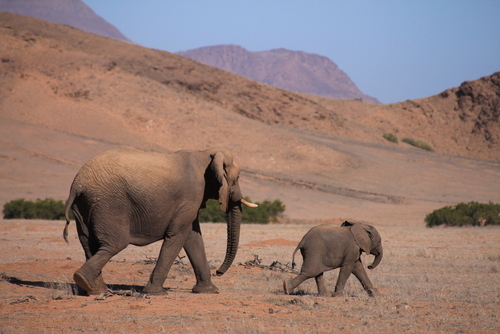See up close Namibia’s magnificent desert elephant populations on this fascinating conservation project and make a difference to the local communities living alongside them. The sole purpose of this award-winning project is to protect the elephants and ensure that the communities that share their land are safe and secure.
The elephants in the desert regions are coming under increasing pressure due to human-wildlife conflict. The elephants that once had vast stretches of the desert to roam, are now frequently coming into contact with humans as they begin to settle in shared land. This is causing significant issues as elephants often enter human settlements in search of water. This project aims to keep both human and elephant safe by preventing these types of situations.
As a volunteer on this project you will be helping the in-country team to achieve their goals via a host of crucial tasks including; tracking and monitoring the elephants, constructing walls to prevent damage to precious water sources and educating the locals about the values of elephant conservation. This is a project not to be missed!
Itinerary
Day 1
Volunteers will be picked up from accommodation in the town of Swakopmund and transferred to the base camp. This will be approximately a 4-hour drive. In the evening, you will join a full orientation and safety briefing.
Day 2-5
Early in the morning, your group will pack and leave for the build-site which is approximately a 1-hour drive. This week you’ll be making the camp home, cooking on the campfire and getting stuck in building those vital protection walls around water sources and building the elephants alternative water points (which we know they’d thank you for)!
Day 6
On Saturday morning, your group will pack up camp and the rest of the weekend is yours to explore, read, swim and most importantly relax! The area around camp is beautiful and the perfect setting for adventurous volunteers to discover.
Day 7
The group may join staff on a trip to the local town of Uis. Here you will find a supermarket, a lodge with internet, a pool and a restaurant. In the evening there is a briefing specific to the upcoming week’s elephant conservation patrol.
Day 8-11
This week all your hard work is rewarded, and the group will head out for elephant conservation patrol duties. See these beautiful and intelligent creatures in their natural habitat and spend the week tracking the local herds and recording the data.
Day 12
After an incredible experience and fond farewells you will transfer back to Swakopmund to begin your independent travel plans or spend a final night.
Project Activities
Construction
The first week focuses on construction tasks, taking place on the build site. These include the building of protection walls around water sources and alternative water-points for the desert elephants and the area’s black rhinos. Understandably, this week is fairly exerting and involves demanding work but is incredibly rewarding and has a huge positive impact on elephant conservation.
Elephant Tracking
The second week is spent tracking the resident herds of desert elephants in the area, to record movement patterns and information such as new births, deaths and mating patterns. The elephant's movements are recorded through their GPS positions which are then plotted onto online maps on a collective database. This information shows which farms the desert elephants tend to visit to drink, and therefore where the project needs to build protection walls.
Patrols
On each patrol there is a different aim, and the current focus is two-fold, one is to have a presence in the area where elephants are under threat and check that all herds are together and without injuries, and the second is to start compiling identification files of ‘new’ herds of elephants in the northern reaches of the area, as these elephants are causing a lot of damage to farms. On each patrol you will spend time interacting with locals, speaking to farmers and communities. On patrol you may also spot some of Namibia’s other incredible wildlife such as giraffe and zebra!
School Visits
The project has aided the local school in renovations over the last seven years and are very proud to have been able to help. The school has over 280 children from the local area, all from farms affected by the presence of elephants, and around 80% of these children board at the school. It is a colourful and smiley place and wonderful place to visit.


